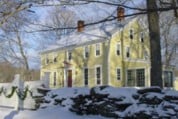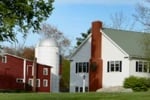MASHAMOQUET BROOK STATE FOREST
Mashamoquet Brook State Forest, nestled in Northeastern Connecticut, is a serene and picturesque natural retreat that captivates visitors with its abundant beauty. Spread across 2,000 acres, this enchanting forest offers a diverse landscape of towering evergreen and deciduous trees, rolling hills, stunning rock formations, and a babbling brook that meanders through the heart of the forest. With its extensive trail system, nature enthusiasts can embark on memorable hikes, discovering hidden gems like ancient Native American caves and serene ponds along the way. The forest also provides a welcome respite for outdoor recreation, boasting picnic areas, a swimming pond, and campsites in a tranquil setting. Whether you seek solitude in the wilderness, a thrilling adventure, or a peaceful day with loved ones, Mashamoquet Brook State Forest promises an unforgettable experience.
The region was once the domain of the Mohegan Chief Uncas. The name Mashamoquet is Indian for "stream of good fishing" and originally was applied to the entire area. Later, Captain John Sabin built a house here to serve as an outpost and the settlement gradually increased in size. In 1723, parish and township privileges were granted and the town became Pomfret, named after Pontefract in Yorkshire, England.The present park area is actually a combination of three parks: the original Mashamoquet Brook, Wolf Den and Saptree Run. A large portion of the park was public domain even prior to the State Park and Forest Commission's creation in 1914 due to the foresight of the Daughters of the American Revolution who had purchased the Wolf Den parcel in 1899. The State purchased this section from them in 1924 for the original 1899 price and added it to the first Mashamoquet Brook parcel which had been a gift of former Pomfret resident Sarah Fay. These areas, other purchases, and gifts (notably, in 1957, the 148 acre Hotchkins Wolf Den Farm parcel) have been combined to form the present 900 acre park.The most famous feature is the Wolf Den into which, on a night in 1742, Israel Putnam crept and shot a wolf that for years had preyed upon local sheep and poultry. Israel Putnam was later to gain fame as a Major General in the Continental Army during the Revolutionary War.Near the Den are the Table Rock and Indian Chair natural stone formations. The Indian Chair is a wide seat-shaped ledge. In the section that is now the entrance to Mashamoquet Brook State Park, there once operated a cider mill, grist mill and wagon shop. The mill dam and pond went out during the flood of 1938. Now only the grist mill is still in existence. It is maintained as a museum by the Pomfret Historical Society. The mill is open on a regular basis and staffed by members of the Historical Society who provide interpretation for all interested visitors.
Connecticut has made state parks, forests, trails, historic sites and beaches more accessible to our residents so they can enjoy the many attractions and beauty they offer. Under the Passport to the Parks program, parking fees are now eliminated at Connecticut State Parks for those with Connecticut registered vehicles. You can view the
CONNECTICUT PASSPORT TO THE PARKS web page to learn more.
Day-UseFishingyes
Hiking Trailyes
Swimming Beachyes
CampingPrimitiveyes
WinterActivitiesyes

BBs / Inns
A Bed Breakfast in the Quiet Corner of Northeast Connecticut on Route 169, a National Scenic Byway.
5 miles from park*



